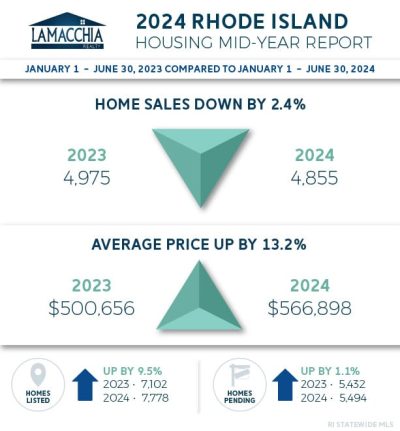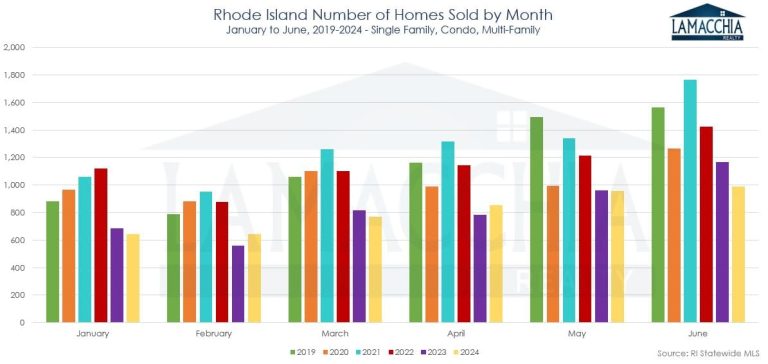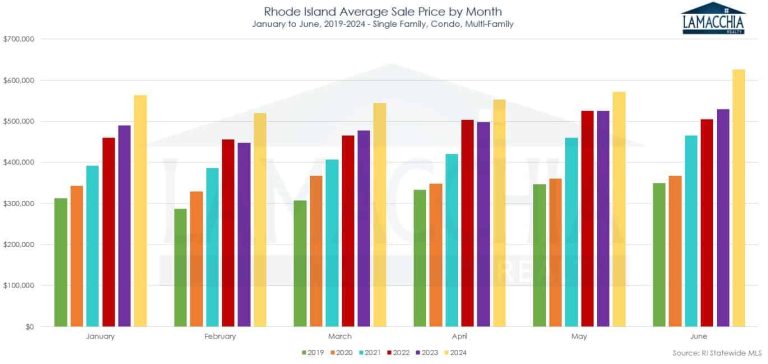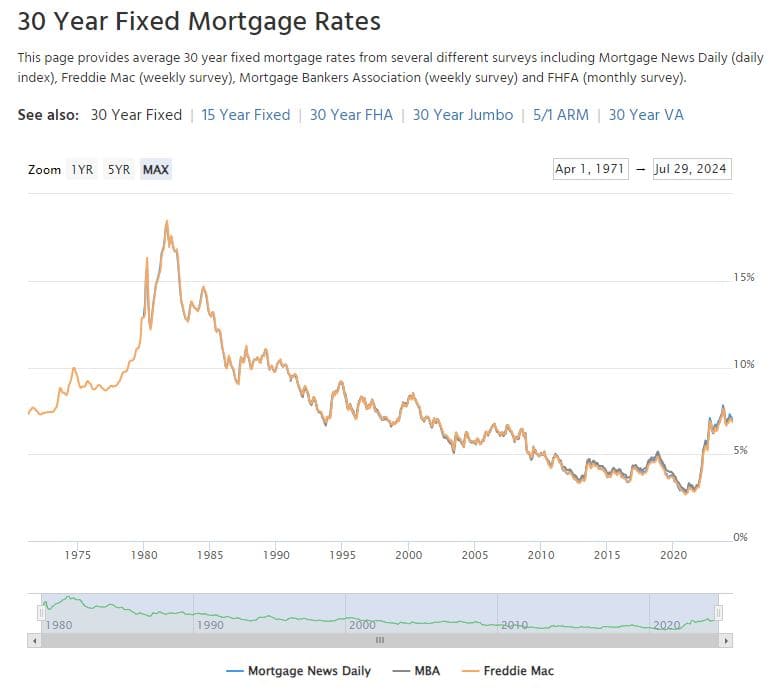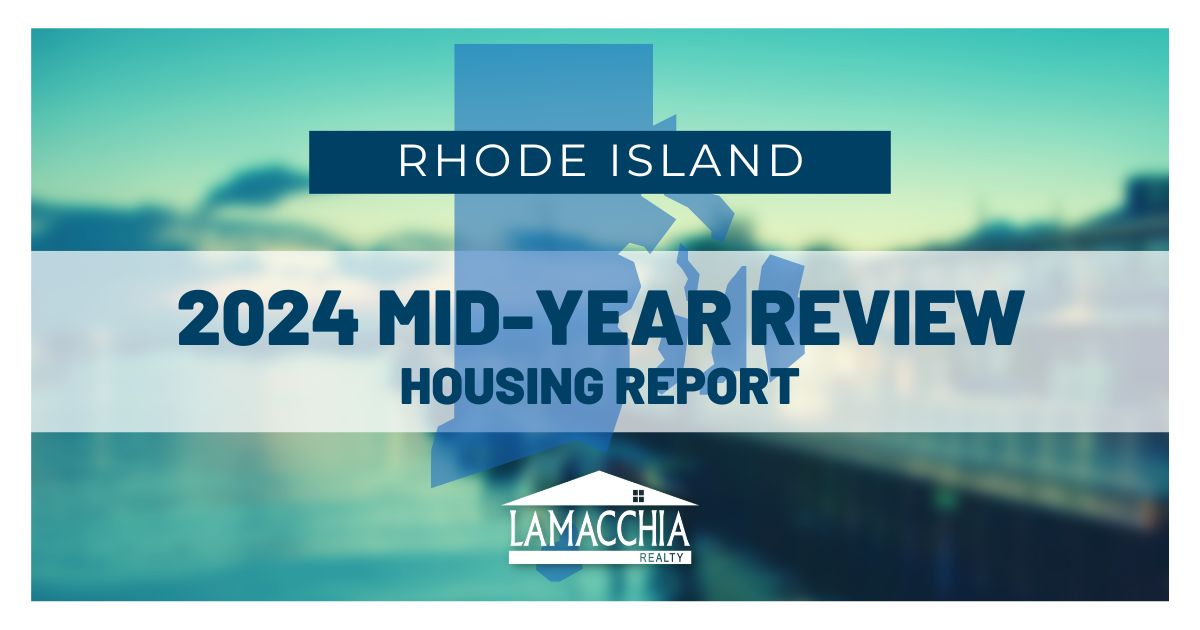
For this report, we are examining the Rhode Island real estate market. Highlighted in this report are the average sale prices for single-family, condominiums, and multi-family homes in Rhode Island along with the number of homes listed for sale and placed under contract. Although Lamacchia has been assisting buyers and sellers in Rhode Island for years, this is our first mid-year report for Rhode Island.
The Rhode Island housing market experienced trends consistent to other New England states in that sales decreased, and prices increased when compared to the first six months of 2023 which also saw sales declines from the previous year of the frenzied Covid market.
Number of Homes Sold Decreased by 2.4%
Home sales decreased to 4,855 total sales compared to the first half of 2023 which had 4,975.
- Single family sales decreased by 5% but condos increased by 2.8% and multi-families increased by 4.8%.
- Despite a decrease in sales in the first half of 2024, the change was minimal compared to mid-2023, when sales dropped by 27.7% overall.
- With an increase in listings (see Homes Listed section below), buyers have had more options, which helped sales perform better than at this time last year.
- Reviewing the chart below, monthly sales in 2023 and 2024 were nearly equal, with 2023 surpassing 2024 in 3 out of 6 months and vice versa, resulting in an overall 2.4% lower sales for 2024.
- Sales levels from the pre- and post-pandemic years (2019-2022) were significantly higher, and we expect a gradual return to those levels as the market continues to recover over the next few years.
- Owners who are locked into covid-era rates between 2 and 4% don’t want to list their homes despite wanting to move because they don’t want to lose their low rate and gain a higher one.
Prices Increase 13.2%
Average prices for homes climbed to $566,898 in the first half of 2024, a 13.2% increase from the first six months of 2023 at $500,656.
- Prices increased in all three categories: singles are up by 14.9%, condos are up by 3.8% and multi-families are up by 16.2%.
- Prices have been rising in Rhode Island for years, but there was the
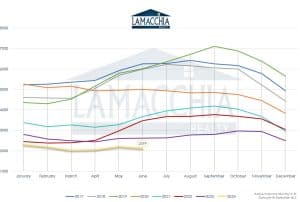 Covid-era spike due to frenzied demand and since then a drop just hasn’t happened due to historically low inventory (see yellow line in chart to right). The extremely tight Rhode Island inventory will make it very unlikely that we will see a price drop.
Covid-era spike due to frenzied demand and since then a drop just hasn’t happened due to historically low inventory (see yellow line in chart to right). The extremely tight Rhode Island inventory will make it very unlikely that we will see a price drop. - If rates are a strong deterrent for buyers looking for more affordable monthly payments, there are several alternative options such as mortgage buydowns or assumptions that are worth exploring.
- The chart below shows how monthly prices over the past four years have steadily increased with 2024 having a record year for Rhode Island.
- Unusually low interest rates in recent years have created unrealistic expectations. Today’s rates, hovering around 6%-7%, are more in line with historical averages. As time goes on, these rates will seem increasingly normal. Waiting to buy a home solely because of interest rates is often unwise. While refinancing could potentially save money if rates drop significantly, it’s important to consider that rising home prices might offset any savings.
Homes Listed for Sale in RI
There were 7,778 new listings in the first half of 2024 compared 7,102 last year, resulting in a 9.5% increase
- This increase in listings indicates that sellers who have been hesitating to list their homes are finally getting off the sidelines. Many sellers were trying to delay as long as possible to hold on to their low, pandemic-era mortgage rate. However, eventually moving is the only option, especially for those experiencing certain lifestyle changes such as divorce, family growth, empty nesters, relocations, changes to job/income, etc.
- With the number of listings up, we will hopefully see pending sales rise as well as new listings is typically an indicator of future pending sales.
Pending Home Sales (contracts accepted)
The number of homes placed under contract increased by 1.1% year over year with 5,494 pending sales over 5,432 last year this time.
- Despite the welcome sign of an increase in pending sales, it’s nominal compared to years past. Clearly, buyers have had more of a chance to buy which increased pending sales slightly, but the market is still tight.
- We could see a slight rise in sales come fall as pending sales are a future indicator of closed sales.
Predictions for the Rest of the Year
Like other New England states, and pretty much nationally, the Rhode Island market has seen a slight decline in sales coupled with a rise in prices, which aligns with our earlier predictions however, this state has particularly tight inventory.
Many sellers are hesitant to list their properties due to the low interest rates secured during the Covid era, making it difficult to accept current rates of around 7%. These rates are unlikely to dramatically change in the foreseeable future.
Sellers are typically compelled to list their homes only when faced with necessity or significant life changes. Events such as divorces, expanding families, relocations, and downsizing have driven the market, but even these factors have not been enough to significantly boost inventory to meet demand. As a result, average housing prices have continued to rise.
Buyers are determined to find homes within their budgets, which are now lower due to rising rates and prices. Monitoring rates and keeping pre-approvals up-to-date is crucial to be ready to strike if rates drop.
Homeownership offers advantages over renting, including full control over your living space, fixed monthly payments, and asset growth through equity. Mortgage interest is often tax-deductible, especially in the early loan stages.
At mid-year, sellers face mixed market conditions. The first half favors sellers, while the latter half shifts towards buyers. Listing your property now can still be beneficial. Setting a competitive price attracts more buyers, providing greater control over negotiations. Sellers should not delay, as waiting for lower rates might mean missing out on the perfect home when they then need to buy. If rates drop and prices stay steady, refinancing can secure a lower interest rate.
National factors influencing the market include both the commission changes and the election. The commission class action settlement will change how real estate commissions are handled, causing some confusion. Starting in August, sellers may only pay their agent’s commission, while buyers pay their agent’s fees out of pocket. This change would have impacted VA buyers, but a temporary amendment allows their benefits to continue. Buyer affordability may be affected since this fee can’t be included in the mortgage. The political landscape might slow down the real estate market this winter due to the election year, but a faster-paced market is expected in 2025 once the changes settle.
Data provided by RI Statewide MLS then compared to the prior year.

